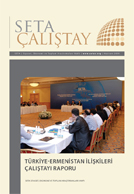SETA PUBLIC LECTURE By Nader Hashemi Josef Korbel School of International Studies, University of Denver Date: June 8, 2009 Monday Time: 16.00 – 18.00 Venue: SETA Foundation, Ankara
It is now a standard cliché that Islam does not recognize the concept of secularity. Normatively, we are told, that among the world’s religious traditions Islam is uniquely anti-modern in that it contains within its religious and civilizational ethos an attitude that rejects the separation of religion and politics. The most influential and widely cited proponent of this thesis in the social sciences has been Bernard Lewis. Lewis’ thesis is based on a comparative treatment of Islam and Christianity and is rooted in the claim that Islam’s problem with secularism is due “to certain profound differences in belief and experience in the two religious cultures.” Mr. Nader Hashemi will try to provide an alternative reading to the Lewis thesis on the question of Islam and secularism.
Summary of Nader Hashemi's Presentation: It is now a standard cliché that Islam does not recognize the concept of secularity. Normatively, we are told, that among the world’s religious traditions Islam is uniquely anti-modern in that it (allegedly) contains within its religious and civilizational ethos an attitude that rejects the separation of religion and politics. The most influential and widely cited proponent of this thesis in the social sciences has been Bernard Lewis, the Cleveland E. Dodge Professor of Near Eastern Studies Emeritus at Princeton University. Lewis’ thesis is based on a comparative treatment of Islam and Christianity and is rooted in the claim that Islam’s problem with secularism is due “to certain profound differences in belief and experience in the two religious cultures.” This paper seeks to provide an alternative reading to the Lewis thesis on the question of Islam and secularism. While previous critics of Lewis have argued that he has misread Islamic history, where evidence of a de facto secularity can be detected in early Muslim polities, it will be argued that Lewis has significantly misread – less the political history of Islam – and more the political history of Christendom. Jettisoning an explanation that emphasises the early religious experience of Islam/Christianity to explain the absence/rise of secularism, in this paper the stress will be placed on the early modern period of Europe. It was during this time that political secularism – as understood today in the Anglo-American tradition – has its true origins. The central claim of this paper is that historically, secularism did not develop in Muslim societies because unlike in Latin Christendom – Muslims never had the need to think about secularism. The second section of this paper deals with the modern period. It explores the negative experiences Muslim societies have had with state-imposed authoritarian and illiberal secularism during the 20th century as way of explaining the general absence of support for political secularism in many Muslim polities today. While Turkey’s history’s falls into this above pattern by the end of the 20th, due to the struggle for democracy and success of multiparty elections, secularism is currently being negotiated in Turkey (from the aggressive French version to the passive American version). I argue this is a positive development that can lead to the consolidation of democracy in Turkey if this process is not interrupted.
Nader Hashemi Hashemi is currently Assistant Professor of Middle East and Islamic Politics in Josef Korbel School of International Studies, University of Denver. He is the author of the book entitled Islam, Secularism and Liberal Democracy: Toward a Democratic Theory for Muslim Societies (New York: Oxford University Press, 2009).








